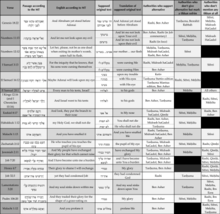Tiqqun soferim
Tiqqūn sōferīm (Hebrew: תיקון סופרים, plural תיקוני סופרים tiqqūnēi sōferīm) is a term from rabbinic literature meaning "correction of scribes" or "scribal correction" and refers to a change of wording in the Tanakh in order to preserve the honor of God or for a similar reason.[2] The rabbis mentioned tiqqunei soferim in several places in their writings, with a total of about 18 tiqqunei soferim in all.[3] Today, the phrase Tiqqun Soferim (alt. Tikkun Soferim) has largely come to refer to the Five Books of Moses written in codices and used to copy therefrom the Torah scroll.

The first to use the term tiqqun soferim was Shimon ben Pazi (an amora); previously, the tannaim had used the phrase kina hakatuv ("the verse used a euphemism") in reference to the same verses.[4]
Many traditional commentators (including Elijah Mizrachi,[5] Rashba,[6] and Joseph Albo[7]) consider tiqqunei soferim not as actual changes in the text, but rather as meaning that the original author acted like one who corrects a text for reasons of honoring God. On the other hand, most modern scholars interpret the words of the old rabbis literally — that the text was corrected by later scribes, perhaps those of the Great Assembly that edited the Biblical corpus. There are also scholars who claim that the rabbis did not give all the cases of tiqqun soferim, and they try to identify other cases.
Even among traditional commentators, including Rashi, there are those who believe that the tiqqunei soferim were actual changes that were made (and this seems to be stated explicitly in the Midrash Tanchuma).
An example of a tiqqun soferim can be seen in I Kings 21:12-13, where Naboth is accused of cursing God, but the text now has "blessed" since it is not fitting that the name of God should appear after the word "cursed": "Naboth has blessed God and King" instead of "Naboth has cursed God and King".
See also
- Qere and ketiv
- Sofer (scribe)
- Tikkun (book)#Tikkun soferim
References
- Based on "Ancient corrections in the text of the Old Testament", Journal of Theological Studies, vol. 1, pp.396-401, Macmillan: New York, 1900.
- Cardozo, Nathan T. Lopes (31 March 1998). The Written and Oral Torah: A Comprehensive Introduction. Jason Aronson, Inc. pp. 24–26. ISBN 978-1-4616-3200-9.
- Singer, Isidore; Adler, Cyrus (1912). The Jewish Encyclopedia: A Descriptive Record of the History, Religion, Literature, and Customs of the Jewish People from the Earliest Times to the Present Day. Funk and Wagnalls. pp. 366–368.
- Yehuda David Eisenstein, Otzar Yisrael - Helek 7 - p.179; Bacher, "Ag. Tan." ii. 205
- Commentary to Deuteronomy 28:30
- Shut haRashba (new from manuscript) 368
- Sefer ha-Ikkarim 3:22
Further reading
- Boncheck, Avigdor. What's Bothering Rashi?: Bamidbar. pp 76-7. Feldheim Publishers, 2001. Jerusalem, Israel
- W. Emery Barnes, Ancient Corrections In the Text of the Old Testament (Tikkun Soopherim), JTS, 1 (1900), pp 387–414.
- Carmel McCarthy, The Tiqqune Sopherim and Other Theological Corrections in the Masoretic Text of the Old Testament. Freiburg & Göttingen: Universitätsverlag, 1981.
- Moshe Zipor, The Masoretic Eighteen Tiqqune Soferim: The Birth and Transformations of a Tradition. Jerusalem: World Union of Jewish Studies, 1990.